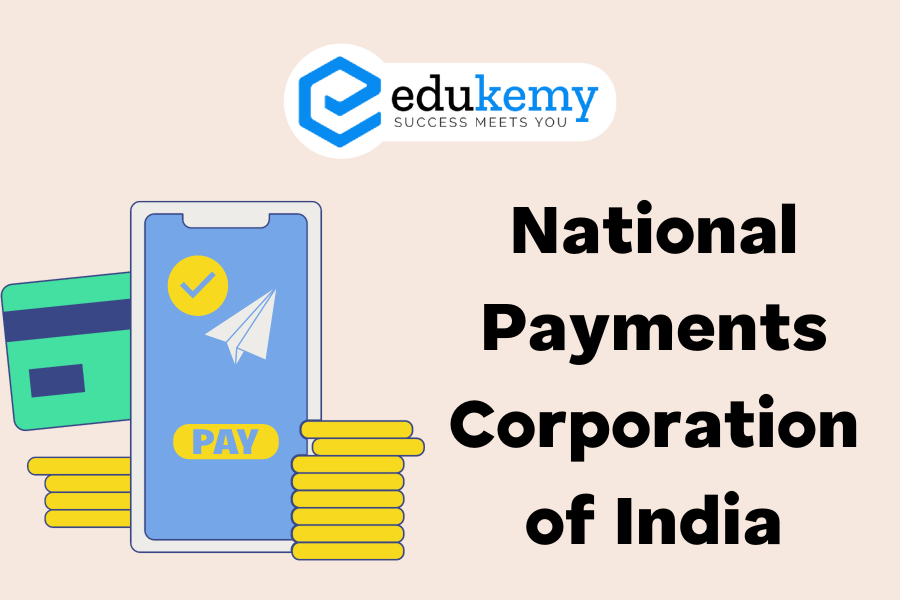
The National Payments Corporation of India (NPCI) was established through collaboration between the Reserve Bank of India (RBI) and the Indian Banks’ Association (IBA) with the aim of managing retail payment and settlement systems in India.
Formed in 2008 under the Payment and Settlement Systems Act of 2007, NPCI operates as a non-profit entity in accordance with Section 8 of the Companies Act 2013.
- NPCI serves as the central entity overseeing retail payment and settlement systems within India, established through a collaborative effort between the Reserve Bank of India (RBI) and the Indian Banks’ Association (IBA) in accordance with the Payment and Settlement Systems Act of 2007.
- Formally registered as a non-profit organization under Section 25 of the Companies Act 1956 (now Section 8 of the Companies Act 2013), its primary objective is to fortify India’s payment and settlement infrastructure.
- With a focus on leveraging technology to enhance operational efficiency and broaden payment accessibility, NPCI continually endeavors to innovate within the retail payment sphere. Ten prominent banks, including the State Bank of India, Punjab National Bank, Citibank, Bank of Baroda, and HSBC, are among its primary promoters.
- Headquartered in Mumbai, NPCI’s regulatory board comprises representatives from the RBI and ten core promoter banks.
- It holds authorization to administer various payment systems, including the National Financial Switch (NFS), Immediate Payment System (IMPS), Aadhaar-enabled Payments System (AEPS), and National Automated Clearing House (NACH).
Contents
Services offered by NPCI
- Bharat Bill Payment Interface (BBPI): Developed by NPCI, BBPI streamlines the retail payments sector by providing a unified platform for aggregators and bill payers.
- Immediate Payment Service (IMPS): IMPS facilitates instant fund transfers, available around the clock. To utilize IMPS, one needs to input beneficiary details including IFSC code and account number.
- RuPay: Introduced by NPCI to democratize financial access, RuPay offers affordable credit, debit, and prepaid cards. With over 300 million cards issued in India, RuPay empowers citizens in making financial transactions.
- USSD Services: NPCI’s USSD service, Unstructured Supplementary Service Data, enables banking transactions without internet or smartphones, enhancing financial inclusion.
- BHIM: Utilizing UPI, BHIM simplifies payment transfers, allowing transactions via Virtual Payment Address (VPA) or registered mobile numbers, without necessitating a smartphone.
- UPI: United Payments Interface (UPI) facilitates smartphone-based fund transfers, requiring linkage of bank accounts, ensuring direct transfers between banks.
FAQs
1. What is the National Payments Corporation of India (NPCI)?
A: The National Payments Corporation of India (NPCI) is an umbrella organization for operating retail payments and settlement systems in India. It is an initiative of the Reserve Bank of India (RBI) and the Indian Banks’ Association (IBA) to promote cashless transactions in the country.
2. What are the key services provided by NPCI?
A: NPCI provides various retail payment and settlement systems such as Unified Payments Interface (UPI), Immediate Payment Service (IMPS), National Electronic Funds Transfer (NEFT), Real-Time Gross Settlement (RTGS), Bharat Bill Payment System (BBPS), and National Automated Clearing House (NACH). These services facilitate seamless and efficient fund transfers across different banks and payment platforms.
3. How does UPI work, and how is NPCI involved?
A: Unified Payments Interface (UPI) is a real-time payment system that allows users to transfer money instantly between bank accounts through a mobile platform. NPCI developed and manages the UPI infrastructure, which enables interoperability among various banks and payment service providers, ensuring secure and convenient fund transfers.
4. Is NPCI involved in promoting financial inclusion in India?
A: Yes, NPCI plays a significant role in promoting financial inclusion in India by providing accessible and affordable payment solutions to all segments of society. Services like UPI, IMPS, and AEPS (Aadhaar Enabled Payment System) facilitate easy access to banking and payment services, even in remote areas, thereby promoting financial empowerment among the underbanked and unbanked population.
5. How does NPCI ensure the security of its payment systems?
A: NPCI implements robust security measures to protect its payment systems from fraud and unauthorized access. These include encryption techniques, two-factor authentication, transaction limits, and constant monitoring of suspicious activities. NPCI collaborates with banks, government agencies, and cybersecurity experts to stay updated on emerging threats and implement necessary safeguards to maintain the integrity and security of its payment infrastructure.
In case you still have your doubts, contact us on 9811333901.
For UPSC Prelims Resources, Click here
For Daily Updates and Study Material:
Join our Telegram Channel – Edukemy for IAS
- 1. Learn through Videos – here
- 2. Be Exam Ready by Practicing Daily MCQs – here
- 3. Daily Newsletter – Get all your Current Affairs Covered – here
- 4. Mains Answer Writing Practice – here

